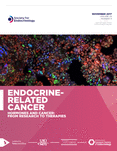Fibroblast growth factor receptors in breast cancer: expression, downstream effects, and possible drug targets
- 1Department of Pathology
2Division of Internal Medicine and Dermatology, University Medical Center Utrecht, PO Box 85500, 3508 GA Utrecht, The Netherlands
- (Correspondence should be addressed to P van der Groep; Email: p.vandergroep{at}umcutrecht.nl)
Abstract
Cancer treatments are increasingly focusing on the molecular mechanisms underlying the oncogenic processes present in tumors of individual patients. Fibroblast growth factor receptors (FGFRs) are among the many molecules that are involved in oncogenesis and are currently under investigation for their potential as drug targets in breast cancer patients. These receptor tyrosine kinases play a role in several processes including proliferation, angiogenesis, and migration. Alterations in these basal processes can contribute to the development and progression of tumors. Among breast cancer patients, several subgroups have been shown to harbor genetic aberrations in FGFRs, including amplifications of FGFR1, FGFR2, and FGFR4 and mutations in FGFR2 and FGFR4. Here, we review in vitro and in vivo models that have partly elucidated the molecular implications of these different genetic aberrations, the resulting tumor characteristics, and the potential of FGFRs as therapeutic targets for breast cancer treatment.
- Revision received 11 April 2012
- Accepted 16 April 2012
- Made available online as an Accepted Preprint 16 April 2012
- © 2012 Society for Endocrinology












